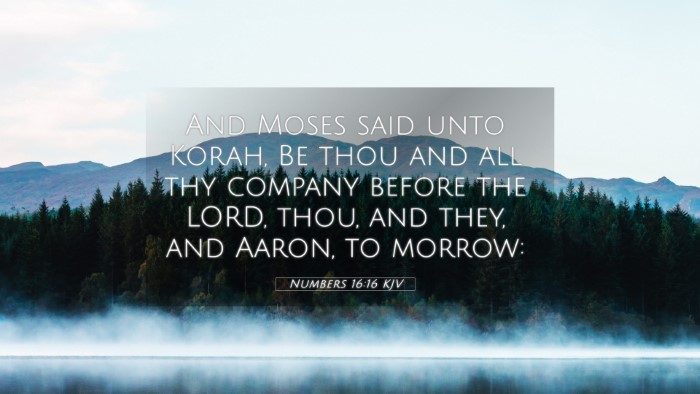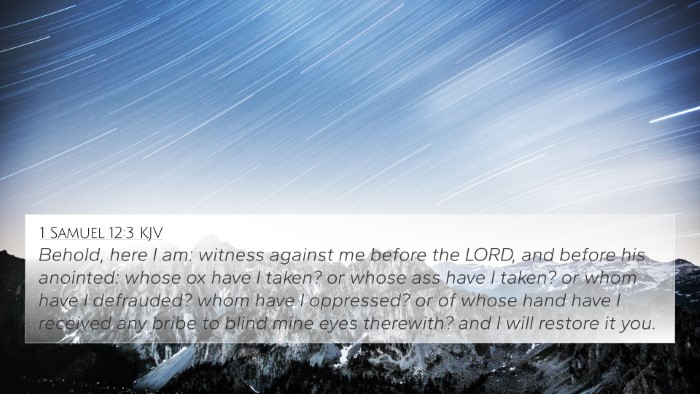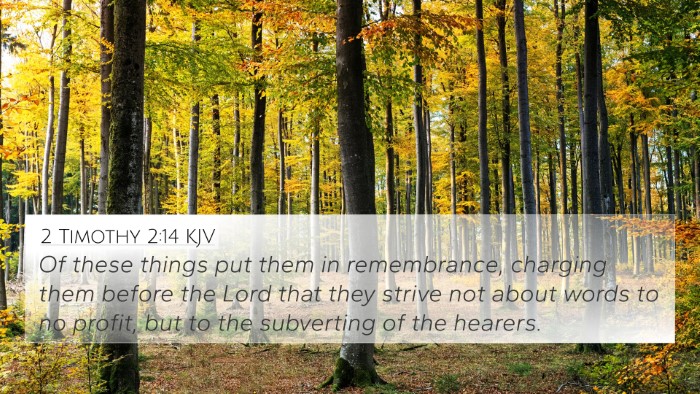Understanding Numbers 16:16
Numbers 16:16 states: "And Moses said unto Korah, Be thou and all thy company before the LORD, thou, and they, and Aaron, to morrow:" This verse is pivotal in the narrative of Korah's rebellion against Moses and Aaron. To fully grasp its significance, we must explore its context, implications, and connections to other biblical texts.
Contextual Analysis
This verse falls within a larger account where Korah, alongside Dathan and Abiram, challenges the leadership of Moses and Aaron. They question why they should be subject to these chosen leaders and seek to elevate themselves within the community of Israelites.
Interpretations from Public Domain Commentaries
-
Matthew Henry: Henry emphasizes the audacity of Korah and his followers in questioning the established authority ordained by God. He notes that Moses, in response, does not retaliate but seeks divine judgment to resolve the conflict. This highlights Moses' humility and reliance on God for vindication.
-
Albert Barnes: Barnes highlights the significance of Moses calling for a public meeting before the Lord. This act demonstrates Moses' commitment to transparency and seeking God's will in the matter, contrasting with Korah's secretive ambitions.
-
Adam Clarke: Clarke connects this event to the broader theme of divine authority versus human pride. He notes that Moses’ call signifies a pivotal moment where the true leadership, ordained by God, is tested against rebellion.
Thematic Connections
The themes in Numbers 16:16 resonate throughout the scriptures. The power struggle between divinely appointed leaders and those who seek authority through rebellion is a recurring narrative. The call for Korah and his company to present themselves before God signifies an impending judgment, a theme prevalent in many biblical accounts.
Cross-References
Understanding Numbers 16:16 can be enriched by examining its connections to other Bible verses. Here are some pertinent cross-references:
- Exodus 32:26 - Moses stands at the gate of the camp, signifying leadership and judgment.
- Numbers 14:5 - Joshua and Caleb demonstrate faith, contrasting with rebellion.
- 1 Samuel 15:23 - The rejection of Saul emphasizes God’s authority over kingship.
- Hebrews 13:17 - A call to respect church leaders, linking to the theme of divinely appointed authority.
- Jude 1:11 - A direct reference to Korah's rebellion serves to remind readers of the consequences of insubordination.
- Galatians 1:10 - The importance of serving God rather than seeking human approval mirrors the conflict between Korah and Moses.
- Acts 5:29 - Obedience to God over men echoes the tension present in Numbers 16.
Exploring Secondary Themes
The rebellion of Korah serves as a cautionary tale about pride and the rejection of divinely ordained leadership. This theme is echoed in several scriptures, including:
- Proverbs 16:18 - "Pride goes before destruction, and a haughty spirit before a fall." This reinforces the dangers of Korah's actions.
- Matthew 20:26-28 - Jesus speaks of servant leadership, contrasting the ambition seen in Korah.
- 1 Peter 5:5 - A call to humility, reflective of the attitude Moses demonstrated.
Practical Applications
Engaging with Numbers 16:16 invites believers to reflect on the nature of authority, humility before God, and the dangers of rebellion. It serves as a reminder that spiritual leadership is not merely about authority, but about serving God and His people faithfully.
Tools for Cross-Referencing
To fully engage with the scriptures, utilizing tools for cross-referencing can enhance understanding:
- Bible Concordance: Helps locate verses by keywords or themes.
- Bible Cross-Reference Guide: Offers thematic connections between scriptures.
- Cross-Reference Bible Study: A methodical approach to studying connected verses.
Conclusion
In conclusion, Numbers 16:16 serves as a profound illustration of the struggle for authority within the community of God's people. By examining this verse and its connections, believers can gain deeper insights into the nature of divine leadership, the consequences of pride, and the importance of humility. Engaging with the broader biblical narrative through cross-referencing not only enhances our understanding but also fortifies our faith.






